LMMB037 - Business and Sustainability: A Critical Analysis Essay
VerifiedAdded on 2023/03/23
|15
|4290
|27
Essay
AI Summary
This essay critically evaluates the theories and models relevant to business and sustainability, including the Triple Bottom Line, CSR, and business ethics. It highlights the importance of corporate social responsibility and stakeholder theory, while also analysing the impact of globalization on sustainability concerns. The essay discusses ethical principles such as integrity, loyalty, and honesty, and emphasizes the role of ethical leadership. It explores the interconnections between business ethics, sustainability, and globalization, addressing legal and cultural challenges that businesses face when operating in international markets. The analysis incorporates the concept of corporate sustainability, emphasizing the integration of social, economic, and environmental aspects to meet the needs of both current and future stakeholders.
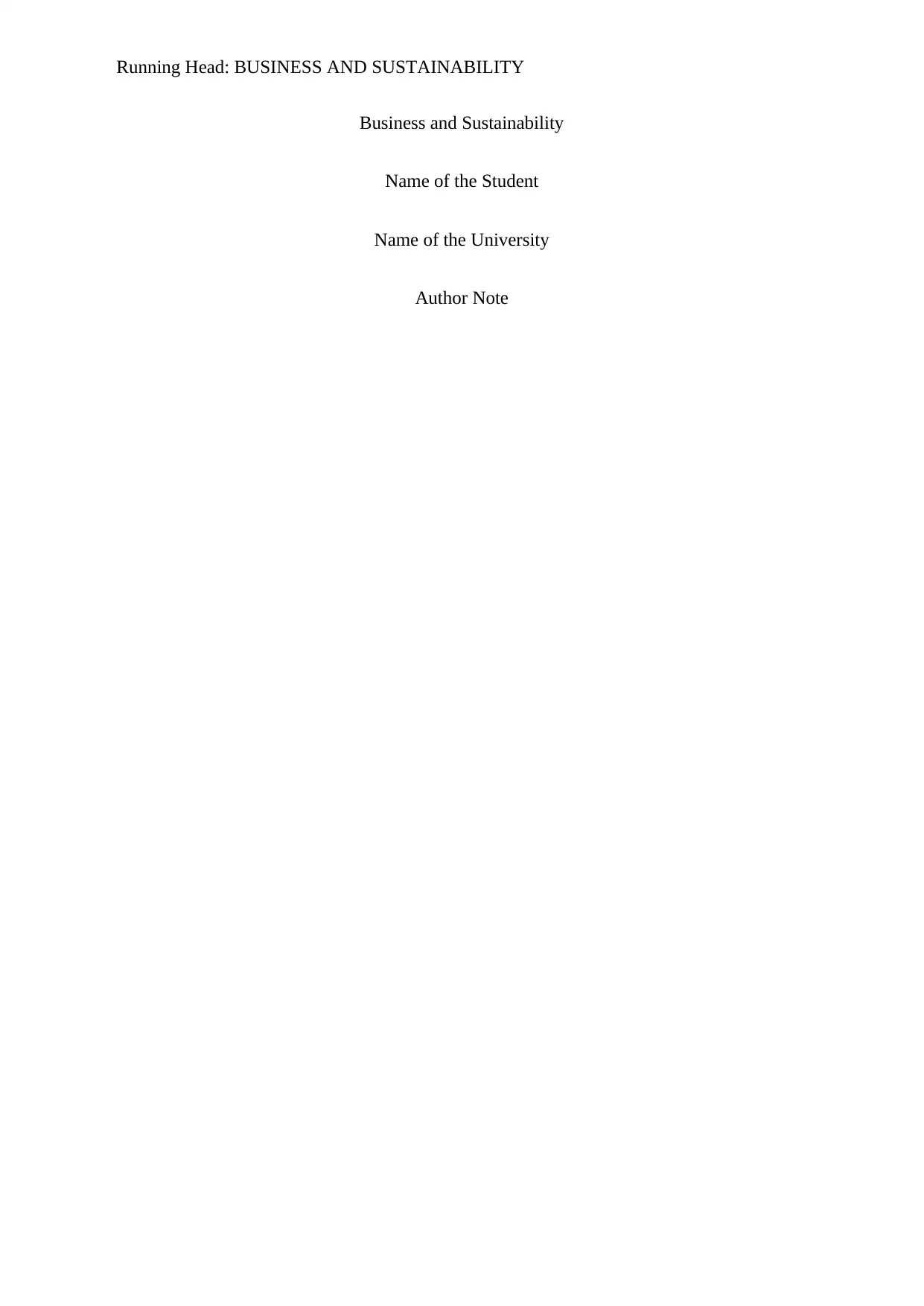
Running Head: BUSINESS AND SUSTAINABILITY
Business and Sustainability
Name of the Student
Name of the University
Author Note
Business and Sustainability
Name of the Student
Name of the University
Author Note
Paraphrase This Document
Need a fresh take? Get an instant paraphrase of this document with our AI Paraphraser
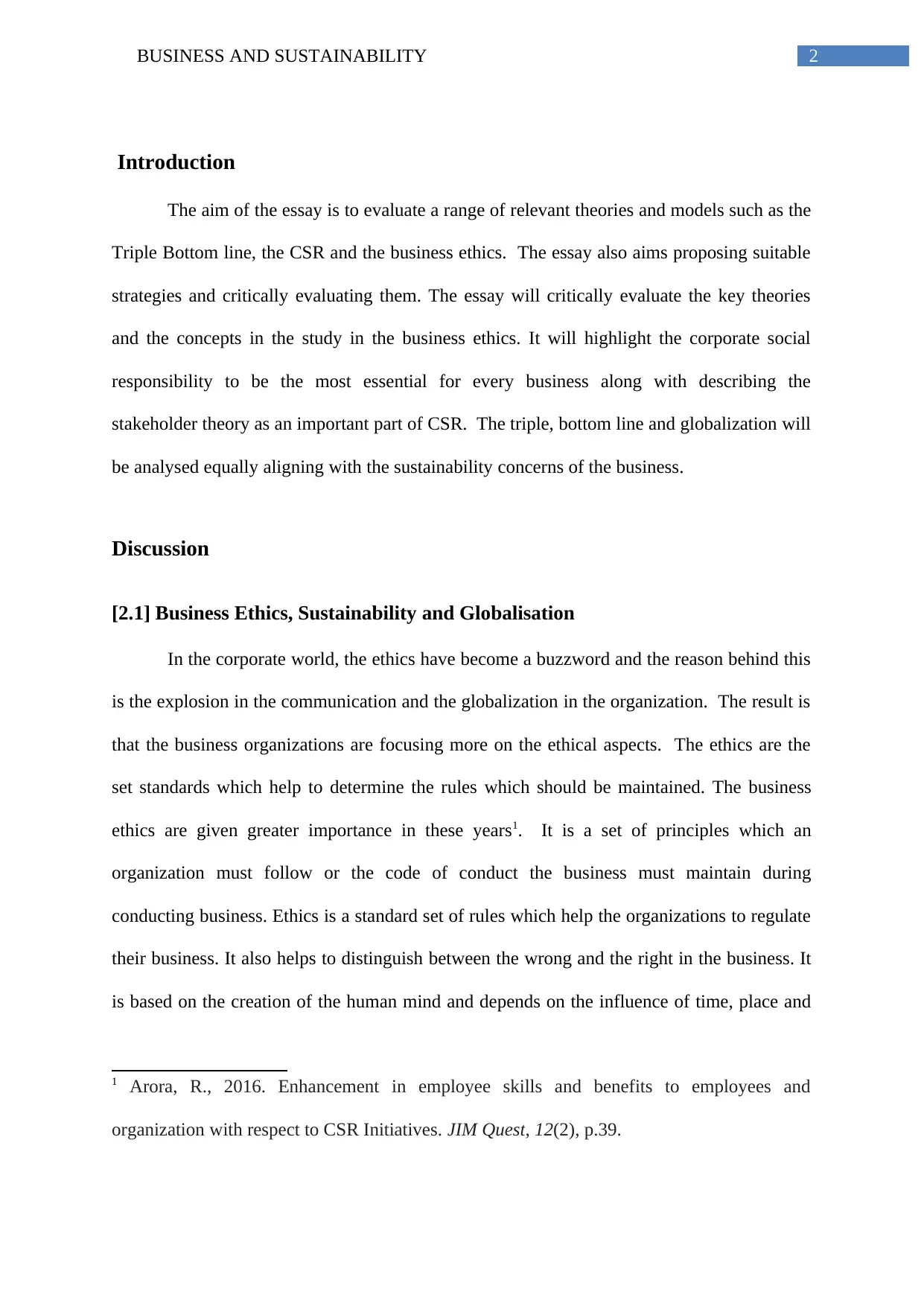
2BUSINESS AND SUSTAINABILITY
Introduction
The aim of the essay is to evaluate a range of relevant theories and models such as the
Triple Bottom line, the CSR and the business ethics. The essay also aims proposing suitable
strategies and critically evaluating them. The essay will critically evaluate the key theories
and the concepts in the study in the business ethics. It will highlight the corporate social
responsibility to be the most essential for every business along with describing the
stakeholder theory as an important part of CSR. The triple, bottom line and globalization will
be analysed equally aligning with the sustainability concerns of the business.
Discussion
[2.1] Business Ethics, Sustainability and Globalisation
In the corporate world, the ethics have become a buzzword and the reason behind this
is the explosion in the communication and the globalization in the organization. The result is
that the business organizations are focusing more on the ethical aspects. The ethics are the
set standards which help to determine the rules which should be maintained. The business
ethics are given greater importance in these years1. It is a set of principles which an
organization must follow or the code of conduct the business must maintain during
conducting business. Ethics is a standard set of rules which help the organizations to regulate
their business. It also helps to distinguish between the wrong and the right in the business. It
is based on the creation of the human mind and depends on the influence of time, place and
1 Arora, R., 2016. Enhancement in employee skills and benefits to employees and
organization with respect to CSR Initiatives. JIM Quest, 12(2), p.39.
Introduction
The aim of the essay is to evaluate a range of relevant theories and models such as the
Triple Bottom line, the CSR and the business ethics. The essay also aims proposing suitable
strategies and critically evaluating them. The essay will critically evaluate the key theories
and the concepts in the study in the business ethics. It will highlight the corporate social
responsibility to be the most essential for every business along with describing the
stakeholder theory as an important part of CSR. The triple, bottom line and globalization will
be analysed equally aligning with the sustainability concerns of the business.
Discussion
[2.1] Business Ethics, Sustainability and Globalisation
In the corporate world, the ethics have become a buzzword and the reason behind this
is the explosion in the communication and the globalization in the organization. The result is
that the business organizations are focusing more on the ethical aspects. The ethics are the
set standards which help to determine the rules which should be maintained. The business
ethics are given greater importance in these years1. It is a set of principles which an
organization must follow or the code of conduct the business must maintain during
conducting business. Ethics is a standard set of rules which help the organizations to regulate
their business. It also helps to distinguish between the wrong and the right in the business. It
is based on the creation of the human mind and depends on the influence of time, place and
1 Arora, R., 2016. Enhancement in employee skills and benefits to employees and
organization with respect to CSR Initiatives. JIM Quest, 12(2), p.39.
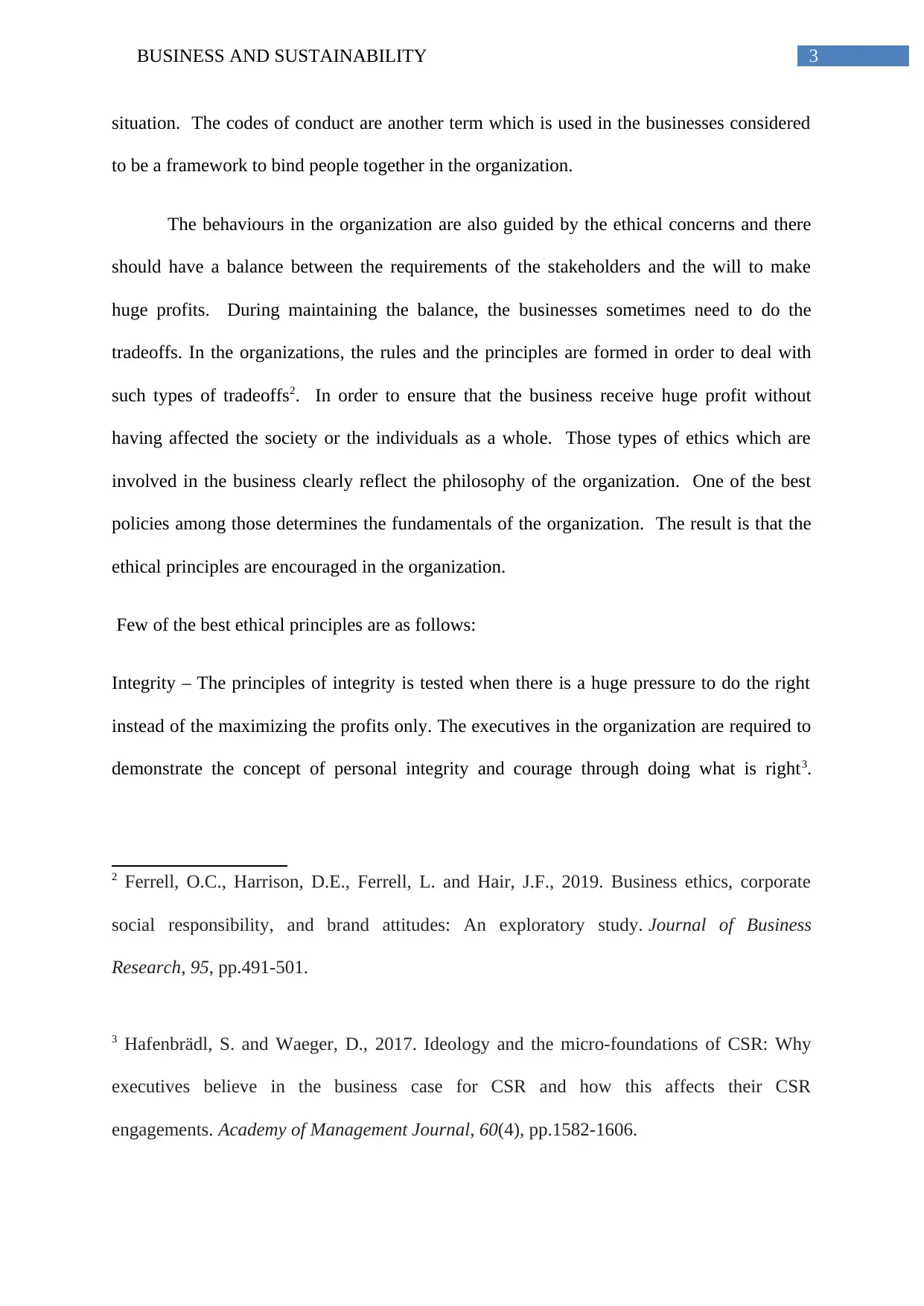
3BUSINESS AND SUSTAINABILITY
situation. The codes of conduct are another term which is used in the businesses considered
to be a framework to bind people together in the organization.
The behaviours in the organization are also guided by the ethical concerns and there
should have a balance between the requirements of the stakeholders and the will to make
huge profits. During maintaining the balance, the businesses sometimes need to do the
tradeoffs. In the organizations, the rules and the principles are formed in order to deal with
such types of tradeoffs2. In order to ensure that the business receive huge profit without
having affected the society or the individuals as a whole. Those types of ethics which are
involved in the business clearly reflect the philosophy of the organization. One of the best
policies among those determines the fundamentals of the organization. The result is that the
ethical principles are encouraged in the organization.
Few of the best ethical principles are as follows:
Integrity – The principles of integrity is tested when there is a huge pressure to do the right
instead of the maximizing the profits only. The executives in the organization are required to
demonstrate the concept of personal integrity and courage through doing what is right3.
2 Ferrell, O.C., Harrison, D.E., Ferrell, L. and Hair, J.F., 2019. Business ethics, corporate
social responsibility, and brand attitudes: An exploratory study. Journal of Business
Research, 95, pp.491-501.
3 Hafenbrädl, S. and Waeger, D., 2017. Ideology and the micro-foundations of CSR: Why
executives believe in the business case for CSR and how this affects their CSR
engagements. Academy of Management Journal, 60(4), pp.1582-1606.
situation. The codes of conduct are another term which is used in the businesses considered
to be a framework to bind people together in the organization.
The behaviours in the organization are also guided by the ethical concerns and there
should have a balance between the requirements of the stakeholders and the will to make
huge profits. During maintaining the balance, the businesses sometimes need to do the
tradeoffs. In the organizations, the rules and the principles are formed in order to deal with
such types of tradeoffs2. In order to ensure that the business receive huge profit without
having affected the society or the individuals as a whole. Those types of ethics which are
involved in the business clearly reflect the philosophy of the organization. One of the best
policies among those determines the fundamentals of the organization. The result is that the
ethical principles are encouraged in the organization.
Few of the best ethical principles are as follows:
Integrity – The principles of integrity is tested when there is a huge pressure to do the right
instead of the maximizing the profits only. The executives in the organization are required to
demonstrate the concept of personal integrity and courage through doing what is right3.
2 Ferrell, O.C., Harrison, D.E., Ferrell, L. and Hair, J.F., 2019. Business ethics, corporate
social responsibility, and brand attitudes: An exploratory study. Journal of Business
Research, 95, pp.491-501.
3 Hafenbrädl, S. and Waeger, D., 2017. Ideology and the micro-foundations of CSR: Why
executives believe in the business case for CSR and how this affects their CSR
engagements. Academy of Management Journal, 60(4), pp.1582-1606.
⊘ This is a preview!⊘
Do you want full access?
Subscribe today to unlock all pages.

Trusted by 1+ million students worldwide
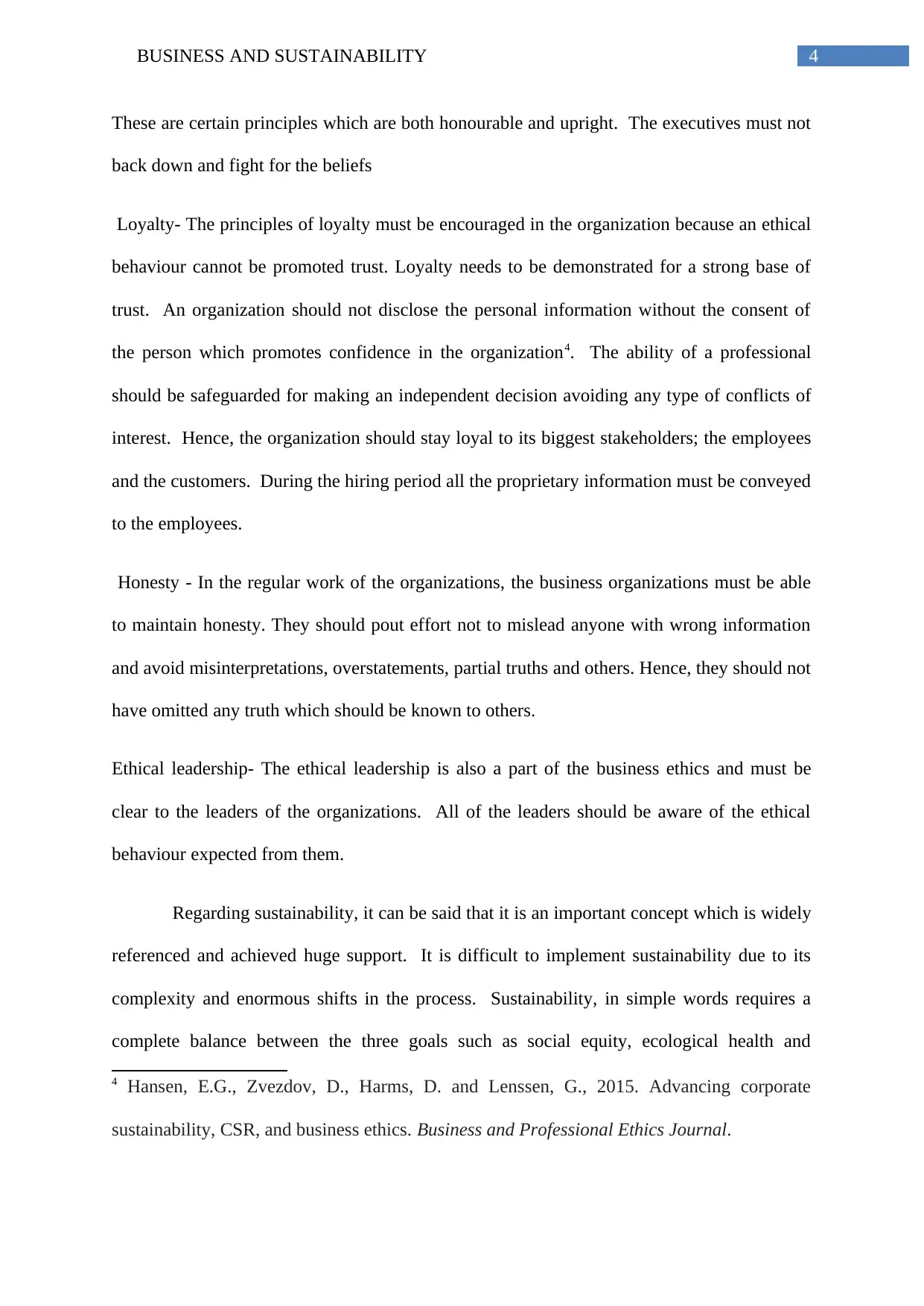
4BUSINESS AND SUSTAINABILITY
These are certain principles which are both honourable and upright. The executives must not
back down and fight for the beliefs
Loyalty- The principles of loyalty must be encouraged in the organization because an ethical
behaviour cannot be promoted trust. Loyalty needs to be demonstrated for a strong base of
trust. An organization should not disclose the personal information without the consent of
the person which promotes confidence in the organization4. The ability of a professional
should be safeguarded for making an independent decision avoiding any type of conflicts of
interest. Hence, the organization should stay loyal to its biggest stakeholders; the employees
and the customers. During the hiring period all the proprietary information must be conveyed
to the employees.
Honesty - In the regular work of the organizations, the business organizations must be able
to maintain honesty. They should pout effort not to mislead anyone with wrong information
and avoid misinterpretations, overstatements, partial truths and others. Hence, they should not
have omitted any truth which should be known to others.
Ethical leadership- The ethical leadership is also a part of the business ethics and must be
clear to the leaders of the organizations. All of the leaders should be aware of the ethical
behaviour expected from them.
Regarding sustainability, it can be said that it is an important concept which is widely
referenced and achieved huge support. It is difficult to implement sustainability due to its
complexity and enormous shifts in the process. Sustainability, in simple words requires a
complete balance between the three goals such as social equity, ecological health and
4 Hansen, E.G., Zvezdov, D., Harms, D. and Lenssen, G., 2015. Advancing corporate
sustainability, CSR, and business ethics. Business and Professional Ethics Journal.
These are certain principles which are both honourable and upright. The executives must not
back down and fight for the beliefs
Loyalty- The principles of loyalty must be encouraged in the organization because an ethical
behaviour cannot be promoted trust. Loyalty needs to be demonstrated for a strong base of
trust. An organization should not disclose the personal information without the consent of
the person which promotes confidence in the organization4. The ability of a professional
should be safeguarded for making an independent decision avoiding any type of conflicts of
interest. Hence, the organization should stay loyal to its biggest stakeholders; the employees
and the customers. During the hiring period all the proprietary information must be conveyed
to the employees.
Honesty - In the regular work of the organizations, the business organizations must be able
to maintain honesty. They should pout effort not to mislead anyone with wrong information
and avoid misinterpretations, overstatements, partial truths and others. Hence, they should not
have omitted any truth which should be known to others.
Ethical leadership- The ethical leadership is also a part of the business ethics and must be
clear to the leaders of the organizations. All of the leaders should be aware of the ethical
behaviour expected from them.
Regarding sustainability, it can be said that it is an important concept which is widely
referenced and achieved huge support. It is difficult to implement sustainability due to its
complexity and enormous shifts in the process. Sustainability, in simple words requires a
complete balance between the three goals such as social equity, ecological health and
4 Hansen, E.G., Zvezdov, D., Harms, D. and Lenssen, G., 2015. Advancing corporate
sustainability, CSR, and business ethics. Business and Professional Ethics Journal.
Paraphrase This Document
Need a fresh take? Get an instant paraphrase of this document with our AI Paraphraser
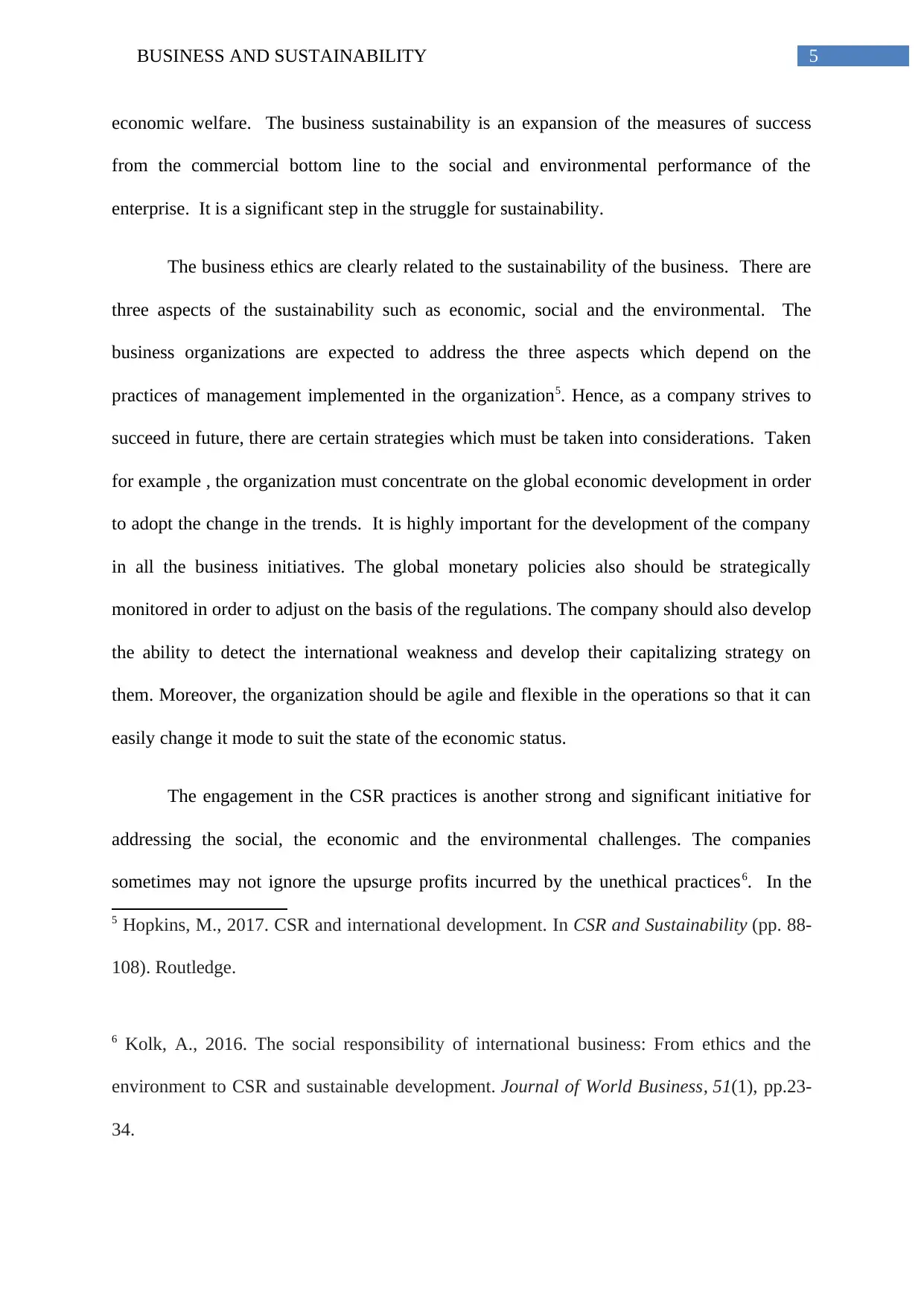
5BUSINESS AND SUSTAINABILITY
economic welfare. The business sustainability is an expansion of the measures of success
from the commercial bottom line to the social and environmental performance of the
enterprise. It is a significant step in the struggle for sustainability.
The business ethics are clearly related to the sustainability of the business. There are
three aspects of the sustainability such as economic, social and the environmental. The
business organizations are expected to address the three aspects which depend on the
practices of management implemented in the organization5. Hence, as a company strives to
succeed in future, there are certain strategies which must be taken into considerations. Taken
for example , the organization must concentrate on the global economic development in order
to adopt the change in the trends. It is highly important for the development of the company
in all the business initiatives. The global monetary policies also should be strategically
monitored in order to adjust on the basis of the regulations. The company should also develop
the ability to detect the international weakness and develop their capitalizing strategy on
them. Moreover, the organization should be agile and flexible in the operations so that it can
easily change it mode to suit the state of the economic status.
The engagement in the CSR practices is another strong and significant initiative for
addressing the social, the economic and the environmental challenges. The companies
sometimes may not ignore the upsurge profits incurred by the unethical practices6. In the
5 Hopkins, M., 2017. CSR and international development. In CSR and Sustainability (pp. 88-
108). Routledge.
6 Kolk, A., 2016. The social responsibility of international business: From ethics and the
environment to CSR and sustainable development. Journal of World Business, 51(1), pp.23-
34.
economic welfare. The business sustainability is an expansion of the measures of success
from the commercial bottom line to the social and environmental performance of the
enterprise. It is a significant step in the struggle for sustainability.
The business ethics are clearly related to the sustainability of the business. There are
three aspects of the sustainability such as economic, social and the environmental. The
business organizations are expected to address the three aspects which depend on the
practices of management implemented in the organization5. Hence, as a company strives to
succeed in future, there are certain strategies which must be taken into considerations. Taken
for example , the organization must concentrate on the global economic development in order
to adopt the change in the trends. It is highly important for the development of the company
in all the business initiatives. The global monetary policies also should be strategically
monitored in order to adjust on the basis of the regulations. The company should also develop
the ability to detect the international weakness and develop their capitalizing strategy on
them. Moreover, the organization should be agile and flexible in the operations so that it can
easily change it mode to suit the state of the economic status.
The engagement in the CSR practices is another strong and significant initiative for
addressing the social, the economic and the environmental challenges. The companies
sometimes may not ignore the upsurge profits incurred by the unethical practices6. In the
5 Hopkins, M., 2017. CSR and international development. In CSR and Sustainability (pp. 88-
108). Routledge.
6 Kolk, A., 2016. The social responsibility of international business: From ethics and the
environment to CSR and sustainable development. Journal of World Business, 51(1), pp.23-
34.
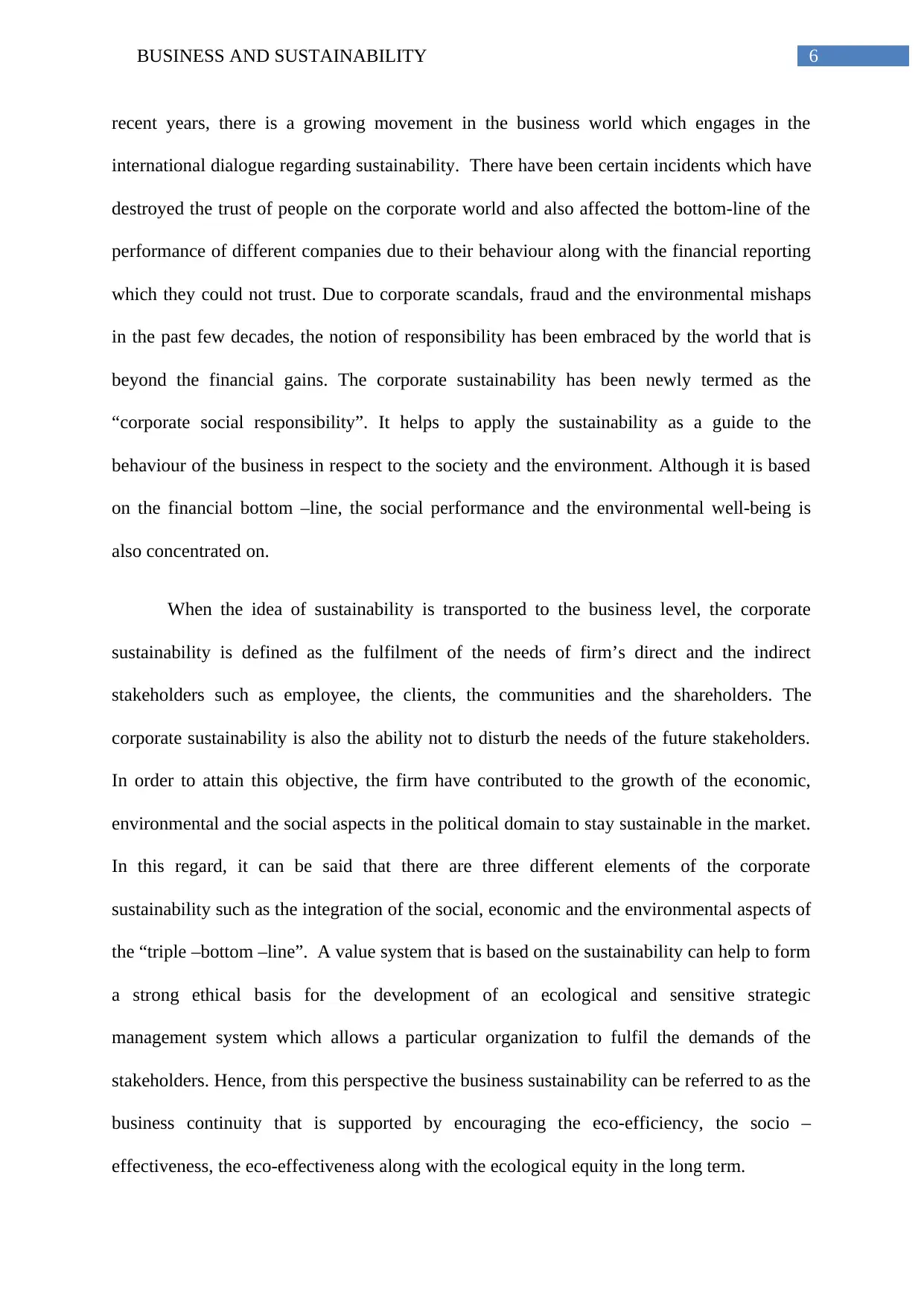
6BUSINESS AND SUSTAINABILITY
recent years, there is a growing movement in the business world which engages in the
international dialogue regarding sustainability. There have been certain incidents which have
destroyed the trust of people on the corporate world and also affected the bottom-line of the
performance of different companies due to their behaviour along with the financial reporting
which they could not trust. Due to corporate scandals, fraud and the environmental mishaps
in the past few decades, the notion of responsibility has been embraced by the world that is
beyond the financial gains. The corporate sustainability has been newly termed as the
“corporate social responsibility”. It helps to apply the sustainability as a guide to the
behaviour of the business in respect to the society and the environment. Although it is based
on the financial bottom –line, the social performance and the environmental well-being is
also concentrated on.
When the idea of sustainability is transported to the business level, the corporate
sustainability is defined as the fulfilment of the needs of firm’s direct and the indirect
stakeholders such as employee, the clients, the communities and the shareholders. The
corporate sustainability is also the ability not to disturb the needs of the future stakeholders.
In order to attain this objective, the firm have contributed to the growth of the economic,
environmental and the social aspects in the political domain to stay sustainable in the market.
In this regard, it can be said that there are three different elements of the corporate
sustainability such as the integration of the social, economic and the environmental aspects of
the “triple –bottom –line”. A value system that is based on the sustainability can help to form
a strong ethical basis for the development of an ecological and sensitive strategic
management system which allows a particular organization to fulfil the demands of the
stakeholders. Hence, from this perspective the business sustainability can be referred to as the
business continuity that is supported by encouraging the eco-efficiency, the socio –
effectiveness, the eco-effectiveness along with the ecological equity in the long term.
recent years, there is a growing movement in the business world which engages in the
international dialogue regarding sustainability. There have been certain incidents which have
destroyed the trust of people on the corporate world and also affected the bottom-line of the
performance of different companies due to their behaviour along with the financial reporting
which they could not trust. Due to corporate scandals, fraud and the environmental mishaps
in the past few decades, the notion of responsibility has been embraced by the world that is
beyond the financial gains. The corporate sustainability has been newly termed as the
“corporate social responsibility”. It helps to apply the sustainability as a guide to the
behaviour of the business in respect to the society and the environment. Although it is based
on the financial bottom –line, the social performance and the environmental well-being is
also concentrated on.
When the idea of sustainability is transported to the business level, the corporate
sustainability is defined as the fulfilment of the needs of firm’s direct and the indirect
stakeholders such as employee, the clients, the communities and the shareholders. The
corporate sustainability is also the ability not to disturb the needs of the future stakeholders.
In order to attain this objective, the firm have contributed to the growth of the economic,
environmental and the social aspects in the political domain to stay sustainable in the market.
In this regard, it can be said that there are three different elements of the corporate
sustainability such as the integration of the social, economic and the environmental aspects of
the “triple –bottom –line”. A value system that is based on the sustainability can help to form
a strong ethical basis for the development of an ecological and sensitive strategic
management system which allows a particular organization to fulfil the demands of the
stakeholders. Hence, from this perspective the business sustainability can be referred to as the
business continuity that is supported by encouraging the eco-efficiency, the socio –
effectiveness, the eco-effectiveness along with the ecological equity in the long term.
⊘ This is a preview!⊘
Do you want full access?
Subscribe today to unlock all pages.

Trusted by 1+ million students worldwide
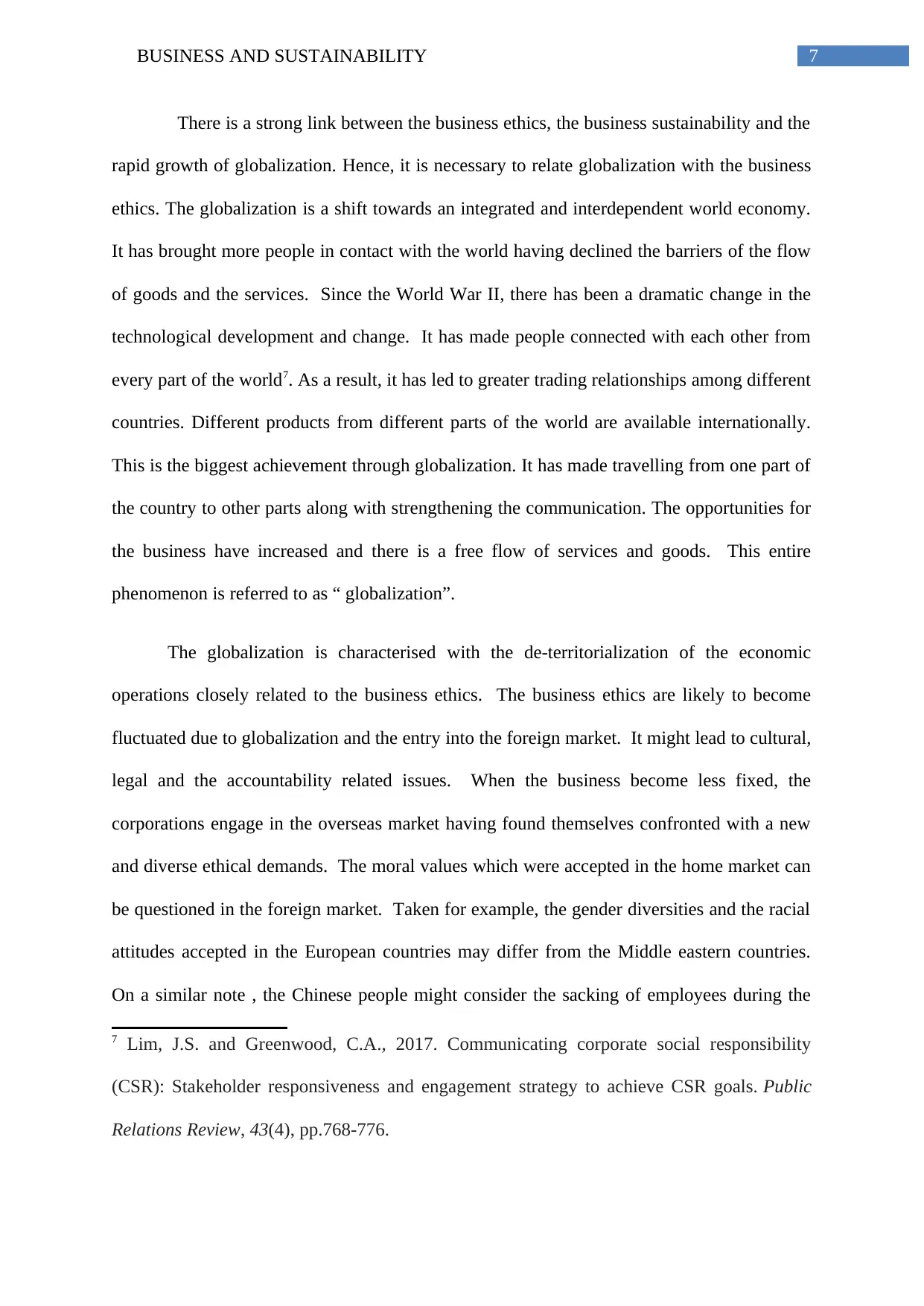
7BUSINESS AND SUSTAINABILITY
There is a strong link between the business ethics, the business sustainability and the
rapid growth of globalization. Hence, it is necessary to relate globalization with the business
ethics. The globalization is a shift towards an integrated and interdependent world economy.
It has brought more people in contact with the world having declined the barriers of the flow
of goods and the services. Since the World War II, there has been a dramatic change in the
technological development and change. It has made people connected with each other from
every part of the world7. As a result, it has led to greater trading relationships among different
countries. Different products from different parts of the world are available internationally.
This is the biggest achievement through globalization. It has made travelling from one part of
the country to other parts along with strengthening the communication. The opportunities for
the business have increased and there is a free flow of services and goods. This entire
phenomenon is referred to as “ globalization”.
The globalization is characterised with the de-territorialization of the economic
operations closely related to the business ethics. The business ethics are likely to become
fluctuated due to globalization and the entry into the foreign market. It might lead to cultural,
legal and the accountability related issues. When the business become less fixed, the
corporations engage in the overseas market having found themselves confronted with a new
and diverse ethical demands. The moral values which were accepted in the home market can
be questioned in the foreign market. Taken for example, the gender diversities and the racial
attitudes accepted in the European countries may differ from the Middle eastern countries.
On a similar note , the Chinese people might consider the sacking of employees during the
7 Lim, J.S. and Greenwood, C.A., 2017. Communicating corporate social responsibility
(CSR): Stakeholder responsiveness and engagement strategy to achieve CSR goals. Public
Relations Review, 43(4), pp.768-776.
There is a strong link between the business ethics, the business sustainability and the
rapid growth of globalization. Hence, it is necessary to relate globalization with the business
ethics. The globalization is a shift towards an integrated and interdependent world economy.
It has brought more people in contact with the world having declined the barriers of the flow
of goods and the services. Since the World War II, there has been a dramatic change in the
technological development and change. It has made people connected with each other from
every part of the world7. As a result, it has led to greater trading relationships among different
countries. Different products from different parts of the world are available internationally.
This is the biggest achievement through globalization. It has made travelling from one part of
the country to other parts along with strengthening the communication. The opportunities for
the business have increased and there is a free flow of services and goods. This entire
phenomenon is referred to as “ globalization”.
The globalization is characterised with the de-territorialization of the economic
operations closely related to the business ethics. The business ethics are likely to become
fluctuated due to globalization and the entry into the foreign market. It might lead to cultural,
legal and the accountability related issues. When the business become less fixed, the
corporations engage in the overseas market having found themselves confronted with a new
and diverse ethical demands. The moral values which were accepted in the home market can
be questioned in the foreign market. Taken for example, the gender diversities and the racial
attitudes accepted in the European countries may differ from the Middle eastern countries.
On a similar note , the Chinese people might consider the sacking of employees during the
7 Lim, J.S. and Greenwood, C.A., 2017. Communicating corporate social responsibility
(CSR): Stakeholder responsiveness and engagement strategy to achieve CSR goals. Public
Relations Review, 43(4), pp.768-776.
Paraphrase This Document
Need a fresh take? Get an instant paraphrase of this document with our AI Paraphraser
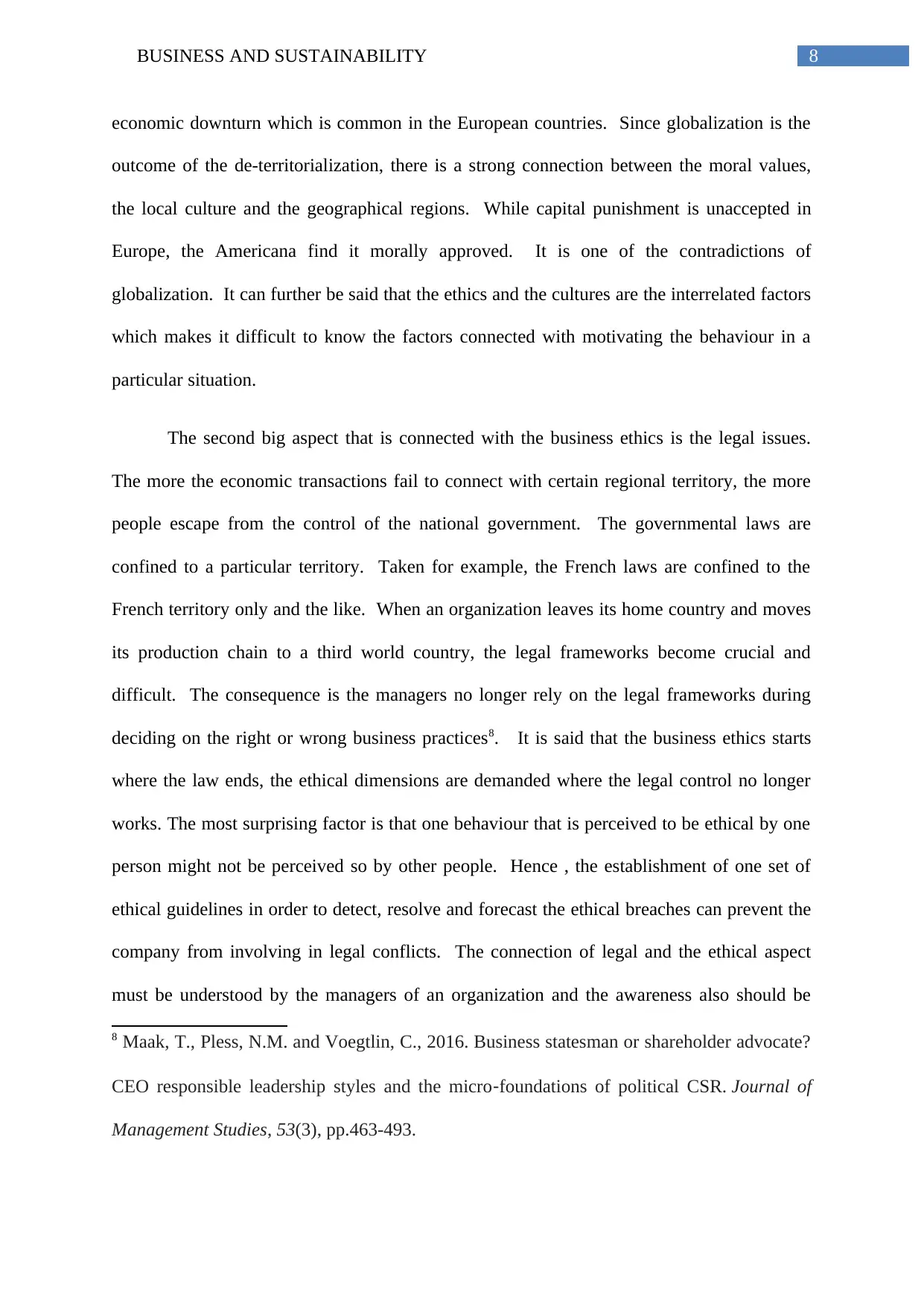
8BUSINESS AND SUSTAINABILITY
economic downturn which is common in the European countries. Since globalization is the
outcome of the de-territorialization, there is a strong connection between the moral values,
the local culture and the geographical regions. While capital punishment is unaccepted in
Europe, the Americana find it morally approved. It is one of the contradictions of
globalization. It can further be said that the ethics and the cultures are the interrelated factors
which makes it difficult to know the factors connected with motivating the behaviour in a
particular situation.
The second big aspect that is connected with the business ethics is the legal issues.
The more the economic transactions fail to connect with certain regional territory, the more
people escape from the control of the national government. The governmental laws are
confined to a particular territory. Taken for example, the French laws are confined to the
French territory only and the like. When an organization leaves its home country and moves
its production chain to a third world country, the legal frameworks become crucial and
difficult. The consequence is the managers no longer rely on the legal frameworks during
deciding on the right or wrong business practices8. It is said that the business ethics starts
where the law ends, the ethical dimensions are demanded where the legal control no longer
works. The most surprising factor is that one behaviour that is perceived to be ethical by one
person might not be perceived so by other people. Hence , the establishment of one set of
ethical guidelines in order to detect, resolve and forecast the ethical breaches can prevent the
company from involving in legal conflicts. The connection of legal and the ethical aspect
must be understood by the managers of an organization and the awareness also should be
8 Maak, T., Pless, N.M. and Voegtlin, C., 2016. Business statesman or shareholder advocate?
CEO responsible leadership styles and the micro‐foundations of political CSR. Journal of
Management Studies, 53(3), pp.463-493.
economic downturn which is common in the European countries. Since globalization is the
outcome of the de-territorialization, there is a strong connection between the moral values,
the local culture and the geographical regions. While capital punishment is unaccepted in
Europe, the Americana find it morally approved. It is one of the contradictions of
globalization. It can further be said that the ethics and the cultures are the interrelated factors
which makes it difficult to know the factors connected with motivating the behaviour in a
particular situation.
The second big aspect that is connected with the business ethics is the legal issues.
The more the economic transactions fail to connect with certain regional territory, the more
people escape from the control of the national government. The governmental laws are
confined to a particular territory. Taken for example, the French laws are confined to the
French territory only and the like. When an organization leaves its home country and moves
its production chain to a third world country, the legal frameworks become crucial and
difficult. The consequence is the managers no longer rely on the legal frameworks during
deciding on the right or wrong business practices8. It is said that the business ethics starts
where the law ends, the ethical dimensions are demanded where the legal control no longer
works. The most surprising factor is that one behaviour that is perceived to be ethical by one
person might not be perceived so by other people. Hence , the establishment of one set of
ethical guidelines in order to detect, resolve and forecast the ethical breaches can prevent the
company from involving in legal conflicts. The connection of legal and the ethical aspect
must be understood by the managers of an organization and the awareness also should be
8 Maak, T., Pless, N.M. and Voegtlin, C., 2016. Business statesman or shareholder advocate?
CEO responsible leadership styles and the micro‐foundations of political CSR. Journal of
Management Studies, 53(3), pp.463-493.
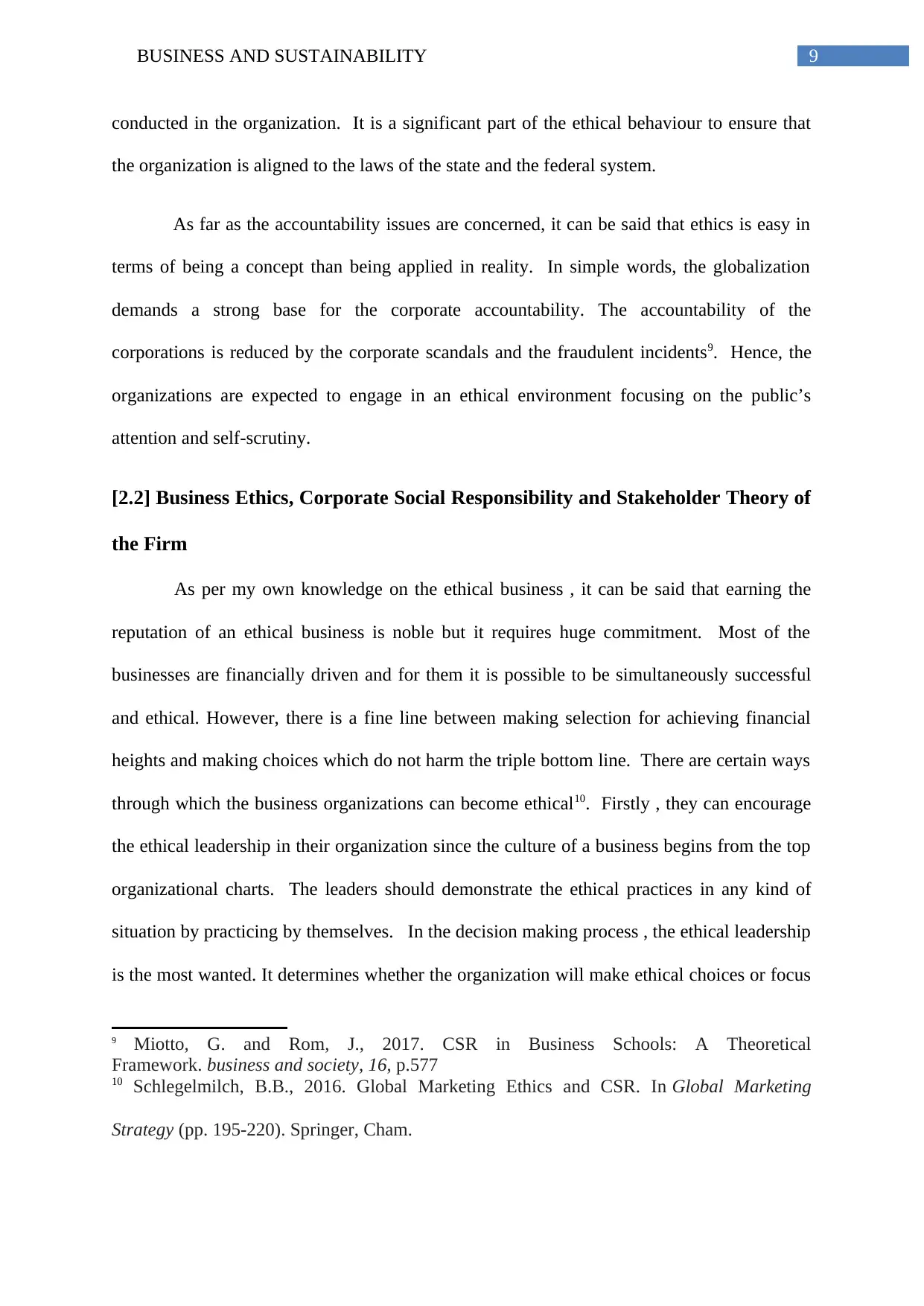
9BUSINESS AND SUSTAINABILITY
conducted in the organization. It is a significant part of the ethical behaviour to ensure that
the organization is aligned to the laws of the state and the federal system.
As far as the accountability issues are concerned, it can be said that ethics is easy in
terms of being a concept than being applied in reality. In simple words, the globalization
demands a strong base for the corporate accountability. The accountability of the
corporations is reduced by the corporate scandals and the fraudulent incidents9. Hence, the
organizations are expected to engage in an ethical environment focusing on the public’s
attention and self-scrutiny.
[2.2] Business Ethics, Corporate Social Responsibility and Stakeholder Theory of
the Firm
As per my own knowledge on the ethical business , it can be said that earning the
reputation of an ethical business is noble but it requires huge commitment. Most of the
businesses are financially driven and for them it is possible to be simultaneously successful
and ethical. However, there is a fine line between making selection for achieving financial
heights and making choices which do not harm the triple bottom line. There are certain ways
through which the business organizations can become ethical10. Firstly , they can encourage
the ethical leadership in their organization since the culture of a business begins from the top
organizational charts. The leaders should demonstrate the ethical practices in any kind of
situation by practicing by themselves. In the decision making process , the ethical leadership
is the most wanted. It determines whether the organization will make ethical choices or focus
9 Miotto, G. and Rom, J., 2017. CSR in Business Schools: A Theoretical
Framework. business and society, 16, p.577
10 Schlegelmilch, B.B., 2016. Global Marketing Ethics and CSR. In Global Marketing
Strategy (pp. 195-220). Springer, Cham.
conducted in the organization. It is a significant part of the ethical behaviour to ensure that
the organization is aligned to the laws of the state and the federal system.
As far as the accountability issues are concerned, it can be said that ethics is easy in
terms of being a concept than being applied in reality. In simple words, the globalization
demands a strong base for the corporate accountability. The accountability of the
corporations is reduced by the corporate scandals and the fraudulent incidents9. Hence, the
organizations are expected to engage in an ethical environment focusing on the public’s
attention and self-scrutiny.
[2.2] Business Ethics, Corporate Social Responsibility and Stakeholder Theory of
the Firm
As per my own knowledge on the ethical business , it can be said that earning the
reputation of an ethical business is noble but it requires huge commitment. Most of the
businesses are financially driven and for them it is possible to be simultaneously successful
and ethical. However, there is a fine line between making selection for achieving financial
heights and making choices which do not harm the triple bottom line. There are certain ways
through which the business organizations can become ethical10. Firstly , they can encourage
the ethical leadership in their organization since the culture of a business begins from the top
organizational charts. The leaders should demonstrate the ethical practices in any kind of
situation by practicing by themselves. In the decision making process , the ethical leadership
is the most wanted. It determines whether the organization will make ethical choices or focus
9 Miotto, G. and Rom, J., 2017. CSR in Business Schools: A Theoretical
Framework. business and society, 16, p.577
10 Schlegelmilch, B.B., 2016. Global Marketing Ethics and CSR. In Global Marketing
Strategy (pp. 195-220). Springer, Cham.
⊘ This is a preview!⊘
Do you want full access?
Subscribe today to unlock all pages.

Trusted by 1+ million students worldwide
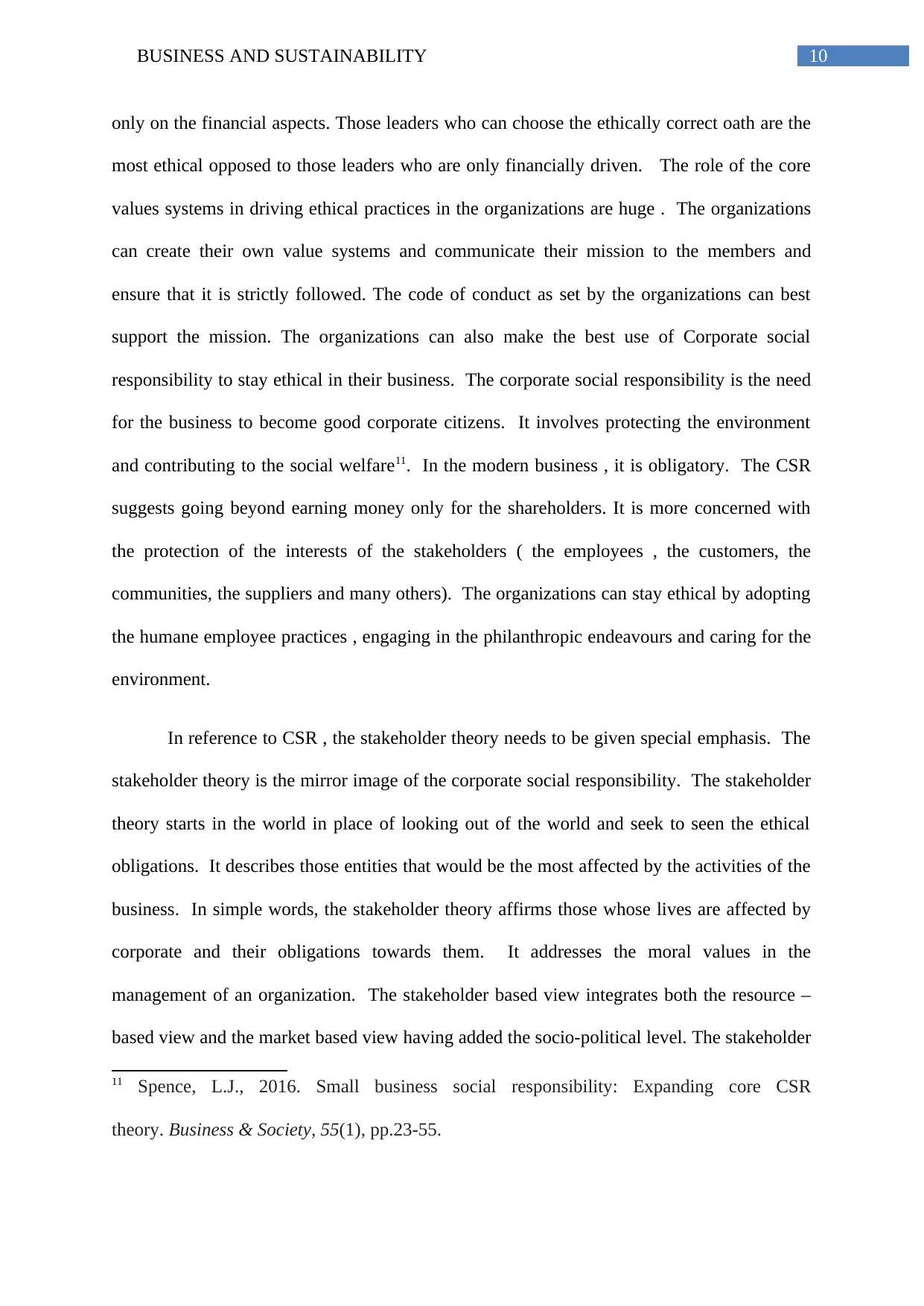
10BUSINESS AND SUSTAINABILITY
only on the financial aspects. Those leaders who can choose the ethically correct oath are the
most ethical opposed to those leaders who are only financially driven. The role of the core
values systems in driving ethical practices in the organizations are huge . The organizations
can create their own value systems and communicate their mission to the members and
ensure that it is strictly followed. The code of conduct as set by the organizations can best
support the mission. The organizations can also make the best use of Corporate social
responsibility to stay ethical in their business. The corporate social responsibility is the need
for the business to become good corporate citizens. It involves protecting the environment
and contributing to the social welfare11. In the modern business , it is obligatory. The CSR
suggests going beyond earning money only for the shareholders. It is more concerned with
the protection of the interests of the stakeholders ( the employees , the customers, the
communities, the suppliers and many others). The organizations can stay ethical by adopting
the humane employee practices , engaging in the philanthropic endeavours and caring for the
environment.
In reference to CSR , the stakeholder theory needs to be given special emphasis. The
stakeholder theory is the mirror image of the corporate social responsibility. The stakeholder
theory starts in the world in place of looking out of the world and seek to seen the ethical
obligations. It describes those entities that would be the most affected by the activities of the
business. In simple words, the stakeholder theory affirms those whose lives are affected by
corporate and their obligations towards them. It addresses the moral values in the
management of an organization. The stakeholder based view integrates both the resource –
based view and the market based view having added the socio-political level. The stakeholder
11 Spence, L.J., 2016. Small business social responsibility: Expanding core CSR
theory. Business & Society, 55(1), pp.23-55.
only on the financial aspects. Those leaders who can choose the ethically correct oath are the
most ethical opposed to those leaders who are only financially driven. The role of the core
values systems in driving ethical practices in the organizations are huge . The organizations
can create their own value systems and communicate their mission to the members and
ensure that it is strictly followed. The code of conduct as set by the organizations can best
support the mission. The organizations can also make the best use of Corporate social
responsibility to stay ethical in their business. The corporate social responsibility is the need
for the business to become good corporate citizens. It involves protecting the environment
and contributing to the social welfare11. In the modern business , it is obligatory. The CSR
suggests going beyond earning money only for the shareholders. It is more concerned with
the protection of the interests of the stakeholders ( the employees , the customers, the
communities, the suppliers and many others). The organizations can stay ethical by adopting
the humane employee practices , engaging in the philanthropic endeavours and caring for the
environment.
In reference to CSR , the stakeholder theory needs to be given special emphasis. The
stakeholder theory is the mirror image of the corporate social responsibility. The stakeholder
theory starts in the world in place of looking out of the world and seek to seen the ethical
obligations. It describes those entities that would be the most affected by the activities of the
business. In simple words, the stakeholder theory affirms those whose lives are affected by
corporate and their obligations towards them. It addresses the moral values in the
management of an organization. The stakeholder based view integrates both the resource –
based view and the market based view having added the socio-political level. The stakeholder
11 Spence, L.J., 2016. Small business social responsibility: Expanding core CSR
theory. Business & Society, 55(1), pp.23-55.
Paraphrase This Document
Need a fresh take? Get an instant paraphrase of this document with our AI Paraphraser
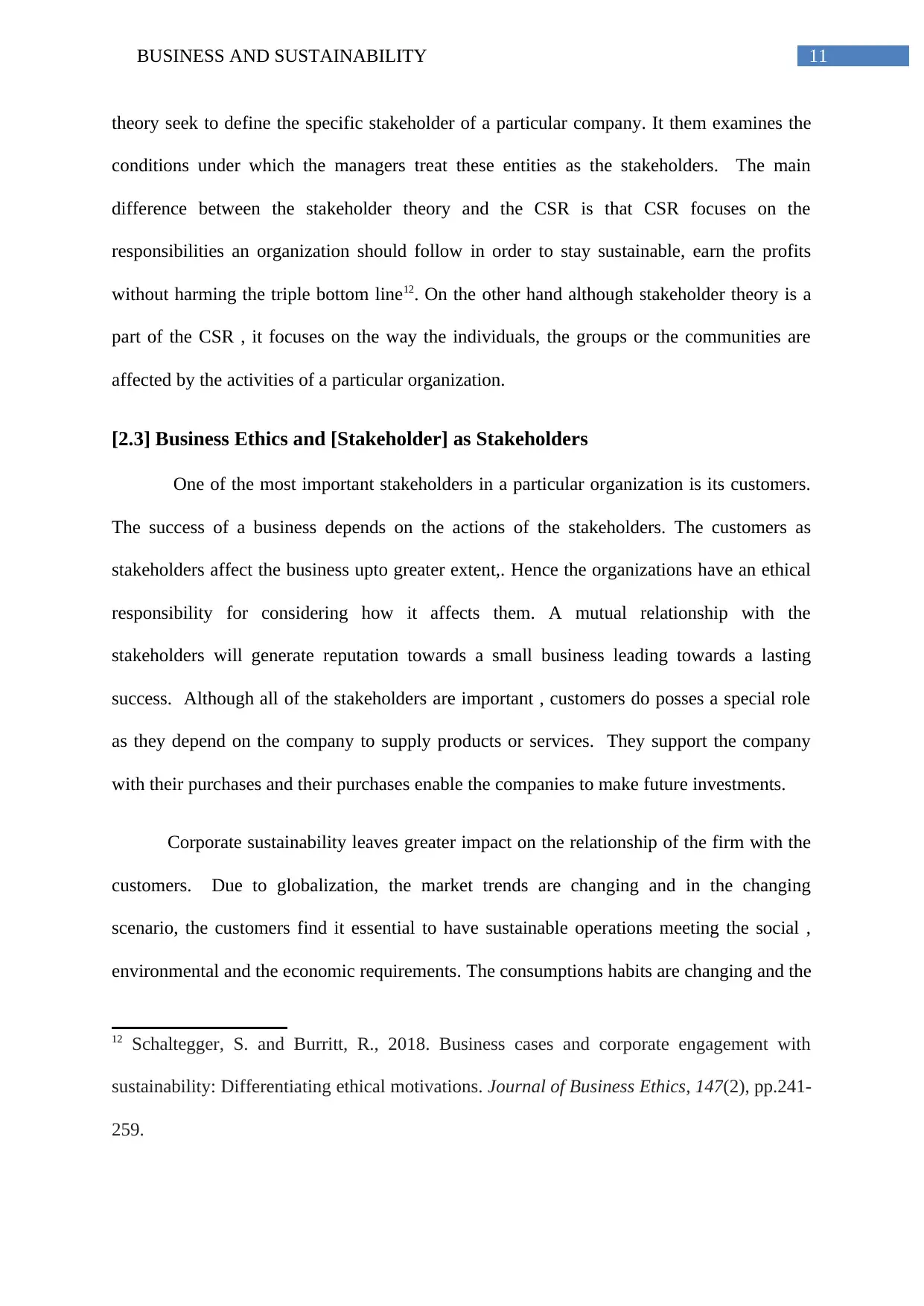
11BUSINESS AND SUSTAINABILITY
theory seek to define the specific stakeholder of a particular company. It them examines the
conditions under which the managers treat these entities as the stakeholders. The main
difference between the stakeholder theory and the CSR is that CSR focuses on the
responsibilities an organization should follow in order to stay sustainable, earn the profits
without harming the triple bottom line12. On the other hand although stakeholder theory is a
part of the CSR , it focuses on the way the individuals, the groups or the communities are
affected by the activities of a particular organization.
[2.3] Business Ethics and [Stakeholder] as Stakeholders
One of the most important stakeholders in a particular organization is its customers.
The success of a business depends on the actions of the stakeholders. The customers as
stakeholders affect the business upto greater extent,. Hence the organizations have an ethical
responsibility for considering how it affects them. A mutual relationship with the
stakeholders will generate reputation towards a small business leading towards a lasting
success. Although all of the stakeholders are important , customers do posses a special role
as they depend on the company to supply products or services. They support the company
with their purchases and their purchases enable the companies to make future investments.
Corporate sustainability leaves greater impact on the relationship of the firm with the
customers. Due to globalization, the market trends are changing and in the changing
scenario, the customers find it essential to have sustainable operations meeting the social ,
environmental and the economic requirements. The consumptions habits are changing and the
12 Schaltegger, S. and Burritt, R., 2018. Business cases and corporate engagement with
sustainability: Differentiating ethical motivations. Journal of Business Ethics, 147(2), pp.241-
259.
theory seek to define the specific stakeholder of a particular company. It them examines the
conditions under which the managers treat these entities as the stakeholders. The main
difference between the stakeholder theory and the CSR is that CSR focuses on the
responsibilities an organization should follow in order to stay sustainable, earn the profits
without harming the triple bottom line12. On the other hand although stakeholder theory is a
part of the CSR , it focuses on the way the individuals, the groups or the communities are
affected by the activities of a particular organization.
[2.3] Business Ethics and [Stakeholder] as Stakeholders
One of the most important stakeholders in a particular organization is its customers.
The success of a business depends on the actions of the stakeholders. The customers as
stakeholders affect the business upto greater extent,. Hence the organizations have an ethical
responsibility for considering how it affects them. A mutual relationship with the
stakeholders will generate reputation towards a small business leading towards a lasting
success. Although all of the stakeholders are important , customers do posses a special role
as they depend on the company to supply products or services. They support the company
with their purchases and their purchases enable the companies to make future investments.
Corporate sustainability leaves greater impact on the relationship of the firm with the
customers. Due to globalization, the market trends are changing and in the changing
scenario, the customers find it essential to have sustainable operations meeting the social ,
environmental and the economic requirements. The consumptions habits are changing and the
12 Schaltegger, S. and Burritt, R., 2018. Business cases and corporate engagement with
sustainability: Differentiating ethical motivations. Journal of Business Ethics, 147(2), pp.241-
259.
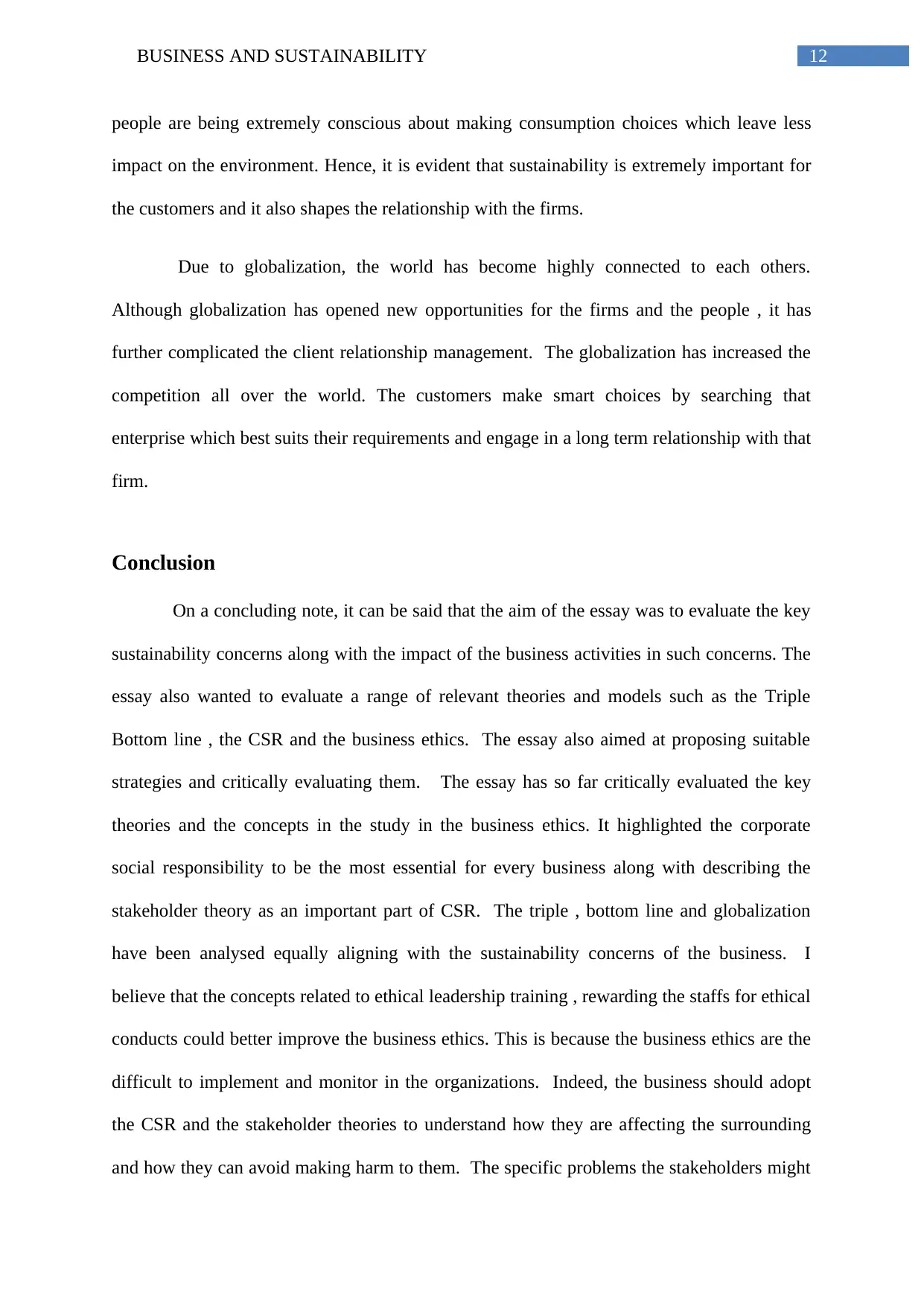
12BUSINESS AND SUSTAINABILITY
people are being extremely conscious about making consumption choices which leave less
impact on the environment. Hence, it is evident that sustainability is extremely important for
the customers and it also shapes the relationship with the firms.
Due to globalization, the world has become highly connected to each others.
Although globalization has opened new opportunities for the firms and the people , it has
further complicated the client relationship management. The globalization has increased the
competition all over the world. The customers make smart choices by searching that
enterprise which best suits their requirements and engage in a long term relationship with that
firm.
Conclusion
On a concluding note, it can be said that the aim of the essay was to evaluate the key
sustainability concerns along with the impact of the business activities in such concerns. The
essay also wanted to evaluate a range of relevant theories and models such as the Triple
Bottom line , the CSR and the business ethics. The essay also aimed at proposing suitable
strategies and critically evaluating them. The essay has so far critically evaluated the key
theories and the concepts in the study in the business ethics. It highlighted the corporate
social responsibility to be the most essential for every business along with describing the
stakeholder theory as an important part of CSR. The triple , bottom line and globalization
have been analysed equally aligning with the sustainability concerns of the business. I
believe that the concepts related to ethical leadership training , rewarding the staffs for ethical
conducts could better improve the business ethics. This is because the business ethics are the
difficult to implement and monitor in the organizations. Indeed, the business should adopt
the CSR and the stakeholder theories to understand how they are affecting the surrounding
and how they can avoid making harm to them. The specific problems the stakeholders might
people are being extremely conscious about making consumption choices which leave less
impact on the environment. Hence, it is evident that sustainability is extremely important for
the customers and it also shapes the relationship with the firms.
Due to globalization, the world has become highly connected to each others.
Although globalization has opened new opportunities for the firms and the people , it has
further complicated the client relationship management. The globalization has increased the
competition all over the world. The customers make smart choices by searching that
enterprise which best suits their requirements and engage in a long term relationship with that
firm.
Conclusion
On a concluding note, it can be said that the aim of the essay was to evaluate the key
sustainability concerns along with the impact of the business activities in such concerns. The
essay also wanted to evaluate a range of relevant theories and models such as the Triple
Bottom line , the CSR and the business ethics. The essay also aimed at proposing suitable
strategies and critically evaluating them. The essay has so far critically evaluated the key
theories and the concepts in the study in the business ethics. It highlighted the corporate
social responsibility to be the most essential for every business along with describing the
stakeholder theory as an important part of CSR. The triple , bottom line and globalization
have been analysed equally aligning with the sustainability concerns of the business. I
believe that the concepts related to ethical leadership training , rewarding the staffs for ethical
conducts could better improve the business ethics. This is because the business ethics are the
difficult to implement and monitor in the organizations. Indeed, the business should adopt
the CSR and the stakeholder theories to understand how they are affecting the surrounding
and how they can avoid making harm to them. The specific problems the stakeholders might
⊘ This is a preview!⊘
Do you want full access?
Subscribe today to unlock all pages.

Trusted by 1+ million students worldwide
1 out of 15
Related Documents
Your All-in-One AI-Powered Toolkit for Academic Success.
+13062052269
info@desklib.com
Available 24*7 on WhatsApp / Email
![[object Object]](/_next/static/media/star-bottom.7253800d.svg)
Unlock your academic potential
Copyright © 2020–2026 A2Z Services. All Rights Reserved. Developed and managed by ZUCOL.





